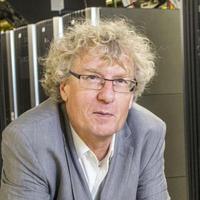Menu
- People
- Curriculum
- Foreign Study
- News & Events
Back to Top Nav
Jack Copeland (University of Canterbury, New Zealand). "Physical Uncomputability and the Nature of Information Processing." Free & open to all. Reception follows.

Abstract: "The Physical Computability Thesis (PCT) states that the physical world is computable. Sometimes it is argued that a well-evidenced logical principle, the Church-Turing Thesis, entails PCT. But this reasoning is faulty. I argue that it is an open question whether PCT is true: even if the universe is finite, physics may turn out to confound PCT. What would a non-computable physics look like, and what would be the implications for scientists and engineers? I review potential countermodels to various formulations of PCT."
Jack Copeland is Distinguished Professor in Arts at the University of Canterbury, New Zealand, where he is Director of the Turing Archive for the History of Computing. An Honorary Research Professor in the School of Historical and Philosophical Inquiry at the University of Queensland, in 2013-14 he was Visiting Professor of Information Science at Copenhagen University. In 2012, he was the Royden B. Davis Visiting Chair of Interdisciplinary Studies in the Department of Psychology at Georgetown University, Washington DC. A Londoner by birth, Jack earned a D.Phil. in mathematical logic from the University of Oxford, studying under Turing's great friend Robin Gandy. Oxford University Press recently published his biography 'Turing' and his comprehensive 'The Turing Guide'. Other books include 'The Essential Turing' (OUP), 'Colossus: The Secrets of Bletchley Park’s Codebreaking Computers' (OUP), 'Alan Turing’s Electronic Brain' (OUP), 'Computability: Turing, Gödel, Church, and Beyond' (MIT Press), 'Logic and Reality' (OUP), and 'Artificial Intelligence' (Wiley-Blackwell). He has more than 100 journal articles on the philosophy and history of computing, and on mathematical and philosophical logic.In 2016 he received the Covey Award, recognizing a substantial record of innovative research in the field of computing and philosophy. In 2017 Jack's name was added to the IT History Society Honor Roll for his "out-of-the-ordinary contribution to the information industry."
Events are free and open to the public unless otherwise noted.